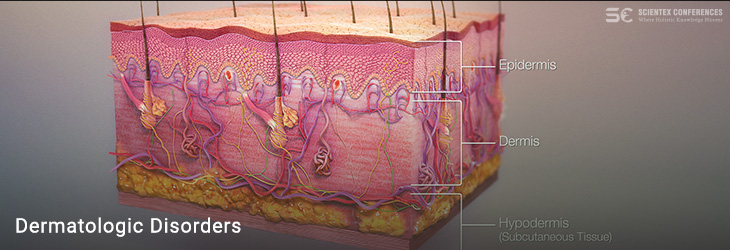Track: Dermatologic Disorders

The spectrum of dermatological disorders includes both common and rare conditions that can significantly impact patients' lives. Understanding these disorders involves examining their underlying mechanisms, clinical presentations, and available treatments. With ongoing research and advancements in medical science, there is a growing ability to diagnose and manage these conditions effectively. This segment offers an in-depth look at several noteworthy disorders, contributing to a broader comprehension of dermatological health.
Pachyonychia Congenita:
Pachyonychia Congenita is a rare genetic disorder characterized by abnormal nail growth, oral leukokeratosis, and other skin abnormalities. The condition is caused by mutations in genes involved in keratin production. Management focuses on symptom relief and monitoring for associated complications.
Muir-Torre Syndrome:
Muir-Torre Syndrome is a genetic condition marked by skin tumors, including sebaceous gland tumors, and a higher risk of internal malignancies. It is often associated with Lynch Syndrome, which increases the risk of colorectal cancer. Early detection and regular surveillance are key to managing the risk of associated cancers.
Primary Cutaneous Marginal Zone Lymphoma (PCMZL):
PCMZL is a type of non-Hodgkin lymphoma that presents primarily in the skin. It is characterized by indolent, localized lesions and is often associated with chronic inflammation or autoimmune conditions. Treatment typically involves localized therapies and, in some cases, systemic treatment depending on disease progression.
Lichen Planopilaris:
Lichen Planopilaris is a type of lichen planus affecting the hair follicles, leading to scarring alopecia. The condition is often associated with pruritic, inflammatory lesions that can result in permanent hair loss. Management focuses on reducing inflammation and preventing further hair loss.
Actinic Prurigo:
Actinic Prurigo is a hypersensitivity reaction to sunlight, leading to intense itching and rash primarily on sun-exposed areas. It is commonly seen in individuals with a genetic predisposition. Treatment includes sun protection and anti-inflammatory medications to manage symptoms and prevent flare-ups.
Hyper IgE Syndrome (Job Syndrome):
Hyper IgE Syndrome is a rare immunodeficiency disorder characterized by elevated immunoglobulin E (IgE) levels and recurrent infections. It presents with eczema, recurrent skin abscesses, and respiratory issues. Management involves treating infections, controlling eczema, and addressing immune system abnormalities.
Glycogen Storage Disease Type IV (Andersen Disease):
Glycogen Storage Disease Type IV, also known as Andersen Disease, is a genetic disorder affecting glycogen metabolism, leading to liver dysfunction and progressive liver cirrhosis. The condition is caused by a deficiency in the enzyme branching enzyme. Treatment focuses on managing symptoms and complications, with liver transplantation as a potential intervention for advanced cases.
Scientific Highlights
- Skin Diseases: Acne, Psoriasis, Dermatitis
- Cosmetic Surgery
- Dermatopathology
- Pediatric Dermatology
- Facelift (Rhytidectomy)
- Aesthetic Medicine
- Plastic Surgery
- Diet & Nutritional Supplements for Healthy Skin
- Oral and Maxillofacial Surgery
- Dermato oncology
- Dermatology
- Trichology and Hair Transplantation
- Vitiligo Treatment
- Rhinoplasty and Otoplasty
- Fungal Skin Infections
- Cosmetology
- Skincare Treatment
- Dermatologic Disorders
- Clinical Trial and Case Reports
- Teledermatology & AI Diagnostics
- Wound Care
- Leprosy in Modern Dermatology
- Onychomycosis
- Regenerative Aesthetics
- Targeted Drug Delivery Systems
- GI Health & Skin


